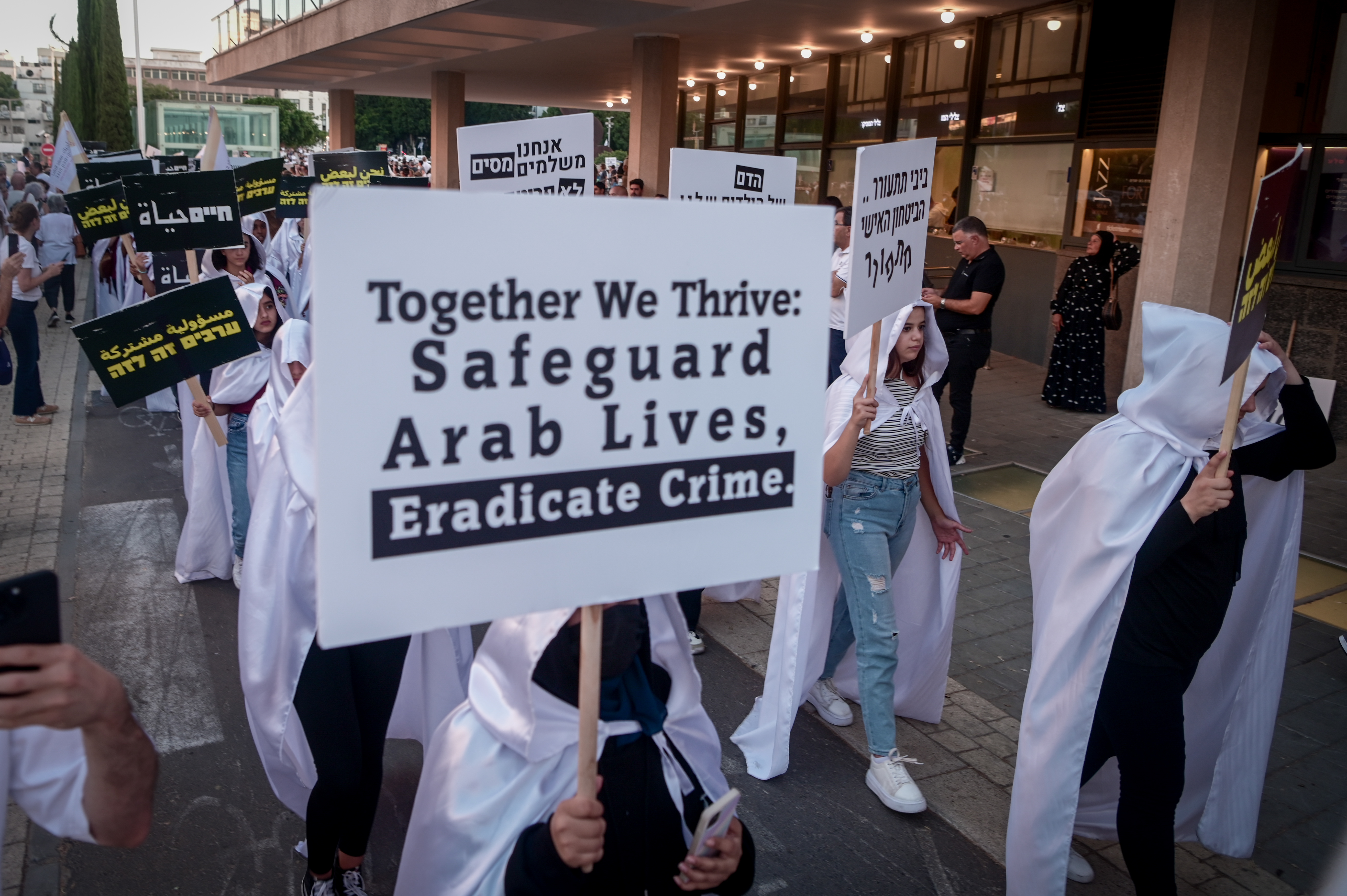The Abandonment of Arab Israelis
Ditching the 5-year plan for the Arab sector will have adverse long-term effects on the Arab's sector ability to integrate into Israel's shared society.

Photo by Avshalom Sassoni/Flash90
Thousands of Israelis marched this Sunday in Tel Aviv in protest of a lack of government intervention amid a wave of violent crime in Arab Israeli communities. Indeed, the number of murder victims in Arab society is astronomical. As of today, over 135 Arab Israelis have been killed since the beginning of 2023. The narrow, quiet, friendly streets that once characterized Arab localities have now turned into battlegrounds that threaten us all and keep the community awake at night. Other countries would have declared a state of emergency, and all of the political and professional bodies would have pooled their resources to deal with the situation. Instead, government ministers are looking for ways to cancel government programs targeted at improving the conditions in Arab Israeli society, exacerbating an already grim situation.
Recently, Minister of National Security Itamar Ben Gvir and Minister of the Negev, the Galilee and National Resilience, Yitzhak Wasserlauf requested that the Cabinet Secretary hold a discussion at their Committee for Arab Society regarding Government Resolution 550. This resolution, which was passed in October 2021, commits to the development of a five-year plan to boost the economic and social situation of Arab society, after years of systematic and deliberate discrimination. Ministers Ben Gvir and Wasserlauf are justifying their proposed changes to Resolution 550 on the grounds of “negative discrimination” against the Jewish population of the Galilee and the Negev, and by claiming they serve to implement the coalition agreements of the previous government. This initiative is yet another act of the current government, and the man at the helm, that will have adverse effects on the Arab population and its status in society.
Resolution 550 would make a significant and long-term contribution to the improvement of the status of Arab citizens and to narrowing the persisting gaps between them and their Jewish peers. Despite the partial implementation of this and various other programs, the 2023 OECD report on Israel underscores the great discrepancies in the labor market between Arabs and Jews and the differences in the quality of education Arab Israelis receive compared to Jewish Israelis. These findings bear out the importance of continuing and even expanding these programs.
The attempt to cancel or cut back on the government programs is consistent with the present government’s fundamental principles to strengthen Jewish supremacy and erode the very foundations of democracy. As we’ve seen in these attempts and others across various government programs, leaders are working to undermine professional bodies that aim to achieve overall economic growth, including economic improvement and significant integration of the Arab population. Canceling these programs is an expression of the systematic undermining of the separation between professional considerations, on the one hand, and the fulfillment of the arbitrary interests, whims, and desires of political echelons, on the other. In practice, this approach will tear down the walls that were meant to protect citizens and safeguard their rights.
Freezing the programs on Arab society or restricting the conditions for their implementation is likely to cause great damage in a number of areas, and on various levels. First, the driving force behind economic programs is a desire to advance the situation of Arabs and improve their status by narrowing gaps and promoting equality among all of Israel’s citizens. In the economic arena, canceling the programs will hit hard at Arab Israeli integration into the economy and torpedo efforts to grow today’s challenged economy – especially in the wake of the judicial reforms and the growing trend among leading companies to transfer their funds and activities from Israel to abroad. Furthermore, halting the programs at this stage will thwart the efforts to increase the percentage of Arabs entering higher education and may raise the percentage of young Arab men defined as “NEET” (not in education, employment or training), putting them at risk of sliding into crime and violence.
It is also impossible to ignore the problematic neo-liberal logic that underlies the government programs. The programs are focused on areas that generate revenue for the State in the short run, especially in the areas of high-tech and women’s employment. This logic is indifferent to the advancement of social equality and ignores the State’s responsibility to empower and strengthen the weaker segments of society. This disregard and disrespect will come at an unbearable social price; indeed, the rise of crime and violence we are now witnessing is related to the Arab Israeli population’s economic situation, and can only get worse as their economic situation deteriorates.
Finally, cutting back government programs or delaying their implementation will block the trend toward the empowerment and integration of the Arab population, intensify feelings of estrangement and alienation, exacerbate mistrust and thwart any future possibility of a shared society. If the decision is implemented, it will, in effect, be a follow-up to the controversial Nation-State Law, reaffirm the ethno-nationalist logic underlying the allocation of material and symbolic resources, and perpetuate the structural subordination of Arabs.
This was first published in the Times of Israel.
